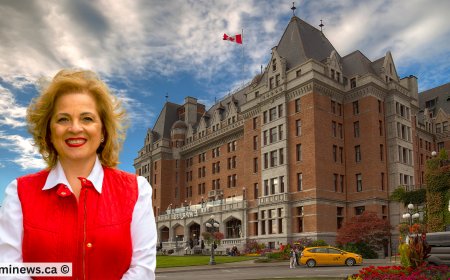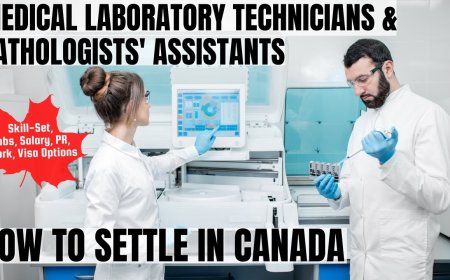Medical radiation technologists Migration to Canada: A Detailed Guide on Salaries, Professional Responsibilities, and Preferred Locations
Welcome to the pathway to Canada immigration for skilled professionals and trade workers. This guide is specifically tailored for Medical radiation technologists looking to work and settle in Canada, offering a deep dive into the essential aspects of immigration and employment in this field.
Introduction
In this article, we will be exploring the career and immigration prospects in Canada for Medical Radiation Technologists, with a focus on the National Occupation Classification code NOC 3215. We will delve into the profile description, main job duties, education and license requirements, skills needed, median age and retirements, salary details, and possible visa options for professionals in this field. Whether you are a current Medical Radiation Technologist looking to immigrate to Canada or a student considering a career in this field, this article will provide you with valuable information to help you navigate your career path in Canada.
What is the Profile Description of a Medical radiation technologists as per the Canadian National Occupation Classification (NOC) Standards?
Medical radiation technologists are professionals who operate radiographic and radiation therapy equipment to administer radiation treatment and produce images of body structures for the purpose of diagnosing and treating injuries and diseases. They work in a variety of settings such as hospitals, cancer treatment centers, clinics, radiological laboratories, and educational institutions. This unit group also includes supervisors and instructors within the field of medical radiation technology.
What are the Main Job Duties of a Medical radiation technologists in Canada?
- Operate various medical imaging equipment such as X-ray, MRI, CT scanners, mammography units, and fluoroscopic equipment to produce diagnostic images.
- Prepare and administer radiopharmaceuticals for nuclear medicine procedures and operate radiation detection equipment to acquire data for diagnosis.
- Administer radiation treatment prescribed by radiation oncologists using linear accelerators and other radiation therapy equipment.
- Provide care and monitoring to patients during imaging procedures or radiation treatment to ensure their physical and psychological well-being.
- Train and supervise student technologists in the field or oversee other technologists to ensure proper procedures are followed and equipment is maintained.
What are the Education, Certifications, and Licensing Requirements to Work as Medical radiation technologists in Canada?
To become a Medical Radiation Technologist, individuals must complete a two- to three-year program in diagnostic radiography, magnetic resonance imaging, nuclear medicine technology, or radiation therapy at a college, hospital, or other approved institution. Alternatively, a bachelor's degree in health sciences specializing in radiography, nuclear medicine, or radiation therapy is also acceptable. Additionally, candidates must undergo a period of supervised practical training. Licensure with a regulatory body is mandatory in Nova Scotia, New Brunswick, Quebec, Ontario, Saskatchewan, and Alberta. Membership in a provincial association is necessary in Newfoundland and Labrador, Prince Edward Island, and Manitoba. Certification by the Canadian Association of Medical Radiation Technologists is required in all provinces except Quebec and British Columbia. Candidates must meet these education and certification requirements to pursue a career as a Medical Radiation Technologist.
What Essential Skills are Required for Medical radiation technologists to succeed in Canada?
To be successful as a Medical Radiation Technologist, one must possess a variety of essential skills. These include the ability to operate radiation therapy equipment effectively, assist radiation oncologists and clinical physicists in developing treatment plans, as well as assist in the preparation of sealed radioactive materials and the construction of plaster casts and acrylic moulds for administering radiation treatment. Additionally, it is crucial for medical radiation technologists to be able to clearly explain procedures and potential side effects of radiation therapy to patients. These skills are essential for providing quality care and ensuring the safety and well-being of patients undergoing radiation treatment.
What is the Median Age and Retirement Age for Medical radiation technologists in Canada?
Unfortunately, the specific median age and average retirement age of Medical radiation technologists is not available at this time. However, it is important to note that these skilled professionals typically have a solid educational background and training in medical imaging technology. As they gain experience and expertise in their field, they play a crucial role in diagnosing and treating various medical conditions using radiation technology. While the retirement age may vary for each individual based on personal preferences and circumstances, Medical radiation technologists are essential members of healthcare teams and contribute significantly to patient care.
How many job openings exist for Other Medical radiation technologists in Canada, and what's their provincial distribution?
There are a total of 26 job openings for Medical Radiation Technologists across Canada. Among the provinces, Québec and Saskatchewan have the highest number of job openings with 9 each, followed by New Brunswick and Ontario with 4 each. The provinces with the maximum job openings are Québec and Saskatchewan, whereas the provinces with the minimum job openings are New Brunswick and Ontario. This indicates a demand for Medical Radiation Technologists in various provinces across Canada, presenting opportunities for professionals in this field to explore different regions and advance their careers.
What is the hourly wage or salary of Medical radiation technologists in different Provinces of Canada?
In Canada, Medical Radiation Technologists can expect varying wages depending on the province in which they work. In British Columbia, the wages range from $28.00 as the lowest to $45.00 as the highest, with a median wage of $34.00. Alberta offers higher wages with the lowest at $30.00, median at $41.75, and the highest at $48.00. Saskatchewan follows with a low of $30.00, median of $36.63, and high of $41.97. Manitoba also provides competitive wages ranging from $30.00 to $44.00, with a median of $36.20. Ontario offers wages between $25.00 and $45.00, with a median of $37.93. Quebec has comparatively lower wages with a low of $23.00, median of $32.00, and high of $35.00. In Atlantic Canada, New Brunswick offers wages from $29.85 to $40.00, with a median of $32.36. Nova Scotia has wages ranging from $28.00 to $45.00, with a median of $34.95. Prince Edward Island provides wages between $26.00 and $41.21, with a median of $34.95. Newfoundland and Labrador offer the highest median wage of $40.00, with wages ranging from $28.00 to $45.00. It is evident that the wages for Medical Radiation Technologists in Canada vary greatly by province, with Alberta and Newfoundland and Labrador offering the highest wages on average.
What are the various visa options available for Medical radiation technologists migrating to Canada?
Medical radiation technologists have a high demand in Canada and are eligible for Category based Express Entry Invitation draws for Canadian PR under the Healthcare Occupations Category. The Express Entry Visa Category allows skilled workers to apply for permanent residency based on factors such as age, education, work experience, and language proficiency. In addition, Medical radiation technologists can also explore Provincial Nominee Programs and Employer Sponsored Work Visas as potential migration options. These programs allow candidates to directly apply for Canadian immigration and may offer additional pathways to permanent residency. It is important to note that there may be other visa options currently available for Medical radiation technologists. To learn more about the migration options and to discuss the best pathway for your profile, schedule an appointment with our professionals today.
Have Questions or Need Assistance?
If you have any queries or require assistance with your immigration plans, we're here to help. Our experienced immigration consultants are ready to provide personalized guidance tailored to your specific needs.
Don't hesitate to reach out and schedule an appointment today. Whether you're seeking clarification on immigration processes, exploring visa options, or need support with documentation, we're dedicated to assisting you every step of the way.
Book an appointment with our team to discuss your immigration goals and receive expert guidance for your journey to Canada.
What's Your Reaction?
 Like
0
Like
0
 Dislike
0
Dislike
0
 Love
0
Love
0
 Funny
0
Funny
0
 Angry
0
Angry
0
 Sad
0
Sad
0
 Wow
0
Wow
0







































































